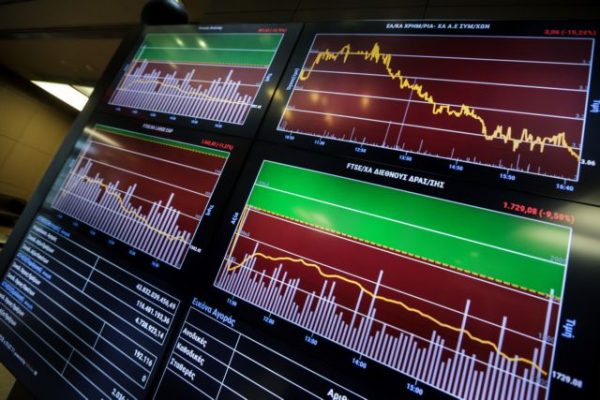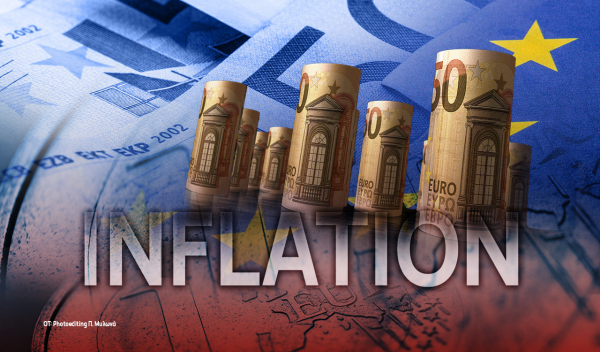
The price rally continues and drivers are at a standstill as fuel prices with commuting destroying family incomes.
Gasoline is stable at 2 euros and 40 cents per liter in large urban centers, while diesel remains above 2 euros despite the subsidy at the pump that was extended until the end of September. At the same time, the inflation rally is shattering any estimate of where prices will go in Greece.
Already the data, announced on Friday (1/7) by the European Statistical Authority (Eurostat) show that inflation for Greece reached 12% in June from 10.5% in May and 9.1% in April. Greek stat authority ELSTAT is expected to announce the national price index on July 8.
Typically, the percentage is expected to be higher than the one recorded by Eurostat, as a harmonized index, which implies that inflastion in Greece is becoming more and more intense.
However, Greece has not had an inflation rate of 12% since December 1993, which is a nearly 29-year high.
It is worth noting that yesterday, in its report on its monetary policy, the Bank of Greece revised its forecast for growth downward to 3.2% (1.8% in the unfavorable scenario) and expects inflation for the whole of the current year to be hit 7.6%.
Inflation in the eurozone
In terms of what contributed to this new big rise in eurozone inflation, energy has the highest annual rate in June (41.9%, up from 39.1% in May), followed by food, alcohol and tobacco (8 .9%, versus 7.5% in May), non-energy industrial goods (4.3%, versus 4.2% in May) and services (3.4%, versus 3.5% in May).
According to a survey by the Athens Chamber of Commerce, necessities and vacations are the first expenses that households cut back on. One in five have cut back on consumer goods and almost one in two say they will take fewer holidays this year, mainly due to financial difficulties.
PULSE RC survey findings
Specifically, from the six-monthly survey of the general population of the Attica Region, by Pulse RC in collaboration with and on behalf of the Athens Chamber of Commerce, the following findings and conclusions emerge:
– The private sector (employees and self-employed) show the same picture as the previous October survey, in the index of concern about the future and sustainability of their work, in the next six months: 48% are worried (up from 51%) – 42% are not worried (from 43%). In the field of professionals and businesses, however, the concern has grown considerably: 60% are worried (from 53%) – 29% are not worried (from 32%).
– A similar picture is reflected in the optimism/pessimism index for the Greek economy, among all residents of the Attica Region. To the question of how they view the course of the Greek economy in the coming months, they answer: 31% optimistic (from 40%) – 68% pessimistic (from 58%)!
The results in the current affairs questions are also interesting:
– The two categories of expenses that are currently the most problematic (even “almost exclusively “, since the rest of the categories register single-digit percentages) for Greek households are energy (electricity, fuel, heating) for almost six out of ten participants, while three out of ten are concerned about basic goods (food, foodstuffs, drinks, super market).
It is noted that the percentage of concern for energy is almost twice that of basic goods.
– In energy, most people (six out of ten) have noticed the largest percentage increase in prices, followed by basic goods here as well.
– Consumer goods (clothes, shoes, electrical appliances) and -almost equally- energy are the two categories of expenses that consumers have mainly reduced in recent months. Close to the above is the percentage of those (one in five) who have limited basic goods. A little lower are recorded those who have made cuts in entertainment and travel.
– Approximately similar percentages are also found in the responses of professionals / entrepreneurs.
– Although the mood for vacations, after almost two years of pandemic and health restrictions, is certainly higher, only 36% of the participants answered that they will allocate the same (more or less and compared to last year) days for their summer vacation this year – only 4% answered “more”.
More than half will take fewer days off this year: three in ten (29%) will take fewer days off and one in four (25%) none at all. The picture is similar for the self-employed.
– As the main reason that this year’s summer vacation days will be reduced, financial difficulties emerge (for three out of four).
Similar percentages, to those of the general population, are also recorded among entrepreneurs / professionals.
– However, the assessment of the government’s measures and announcements to support consumers from price increases is positive: 50% of participants find them in the right direction (most of them, however, consider that more is needed), compared to 42 % who judge that they are moving in the wrong direction.
Latest News

Greece Defines Continental Shelf Limits and Maritime Zones in Landmark EU Document
The Maritime Spatial Planning (MSP) framework represents a comprehensive approach to spatial planning and is crucial for the successful development of a blue and circular economy

EU Praises Greece’s RRF Progress as Revised Recovery Plan Nears Completion
Athens is preparing to submit its revised “Greece 2.0” Recovery and Resilience Plan after Easter, with a slight delay from the initial timeline but with the European Commission’s approval.

Greek €200M 10Y Bond to be Issued on April 16
The 3.875% fixed-interest-rate bond matures on March 12, 2029, and will be issued in dematerialized form. According to PDMA, the goal of the re-issuance is to meet investor demand and to enhance liquidity in the secondary bond market.

German Ambassador to Greece Talks Ukraine, Rise of Far Right & Tariffs at Delphi Economic Forum X
Commenting on the political developments in his country, the German Ambassador stressed that it was clear the rapid formation of a new government was imperative, as the expectations across Europe showed.

Athens to Return Confiscated License Plates Ahead of Easter Holiday
Cases involving court orders will also be excluded from this measure.

Servicers: How More Properties Could Enter the Greek Market
Buying or renting a home is out of reach for many in Greece. Servicers propose faster processes and incentives to boost property supply and ease the housing crisis.

Greek Easter 2025: Price Hikes on Lamb, Eggs & Sweets
According to the Greek Consumers’ Institute, hosting an Easter dinner for eight now costs approximately €361.95 — an increase of €11 compared to 2024.

FM Gerapetritis Calls for Unified EU Response to Global Crises at EU Council
"Europe is navigating through unprecedented crises — wars, humanitarian disasters, climate emergencies," he stated.

Holy Week Store Hours in Greece
Retail stores across Greece are now operating on extended holiday hours for Holy Week, following their Sunday opening on April 13. The move aims to accommodate consumers ahead of Easter, but merchants remain cautious amid sluggish market activity.

Green Getaway Ideas for Easter 2025 in Greece
Celebrate Easter 2025 in Greece the sustainable way with eco-farms, car-free islands, and family-friendly getaways rooted in nature and tradition.









































 Αριθμός Πιστοποίησης
Αριθμός Πιστοποίησης